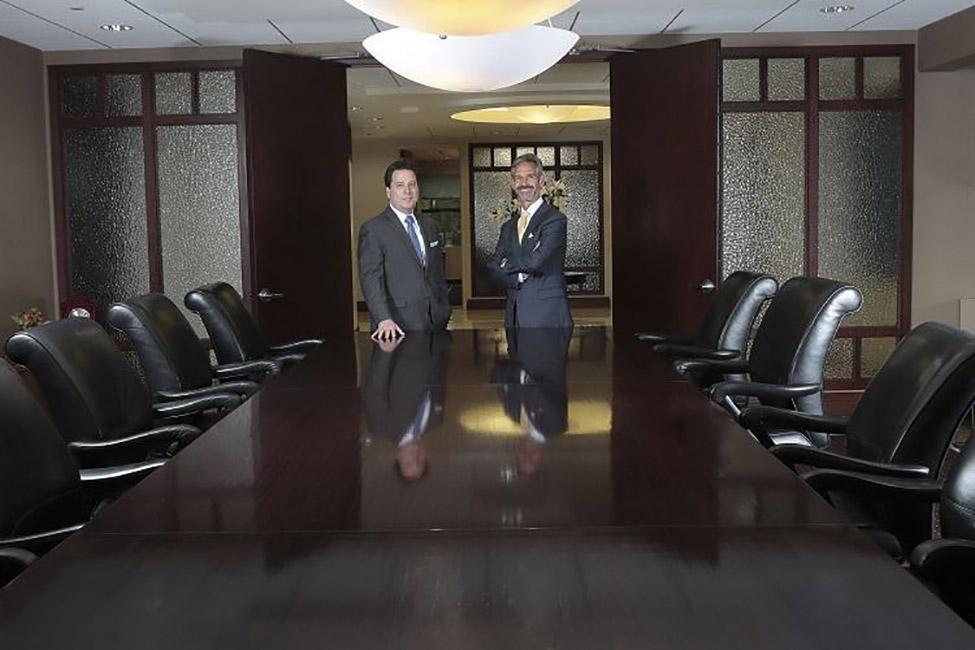
Lienhard School of Nursing Welcomes Inaugural Cohort of HRSA Scholars
Pace College of Health Professions Lienhard School of Nursing welcomed its first cohort of ten enthusiastic HRSA Scholars to the RN4 Nursing Program.
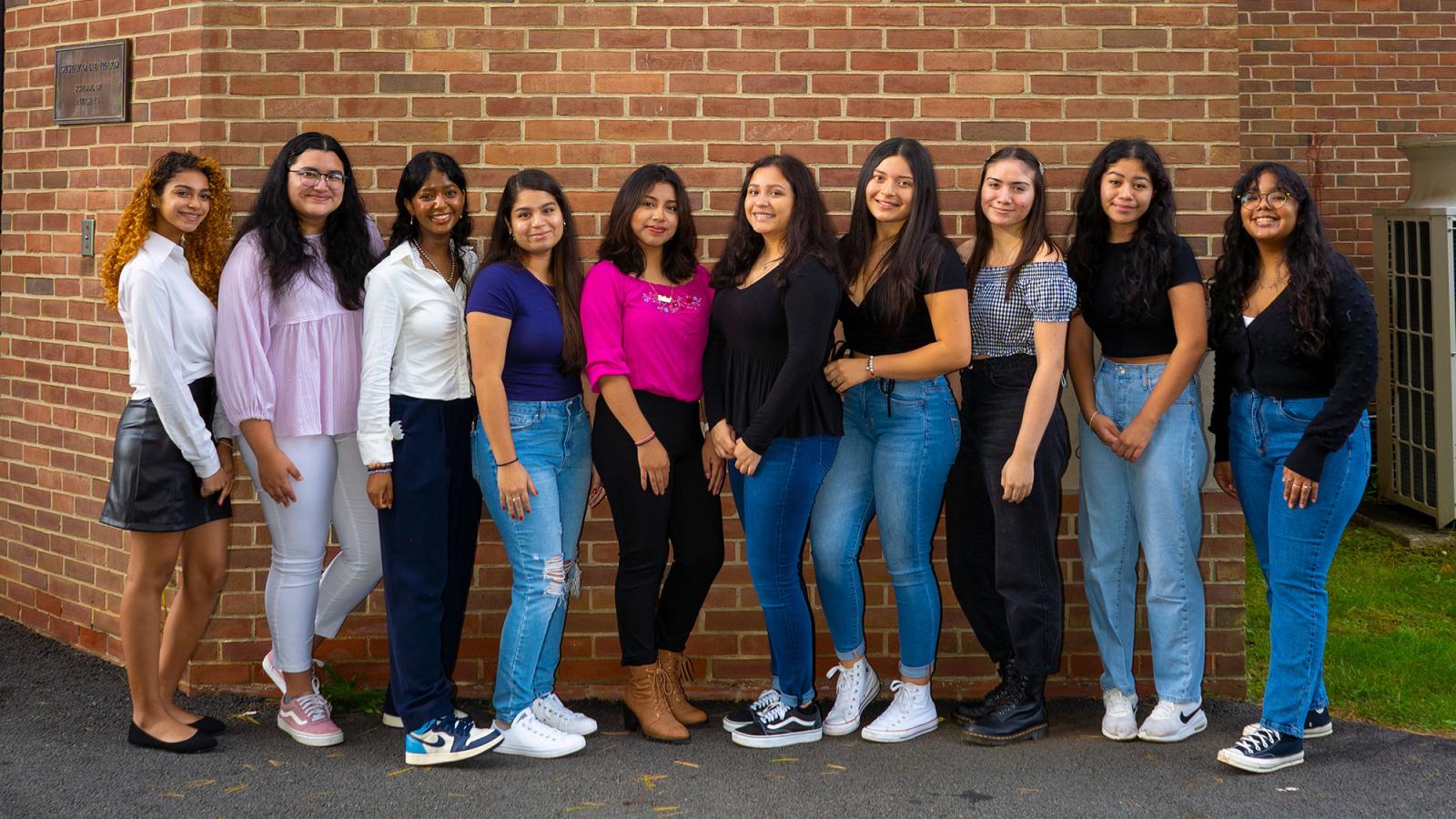
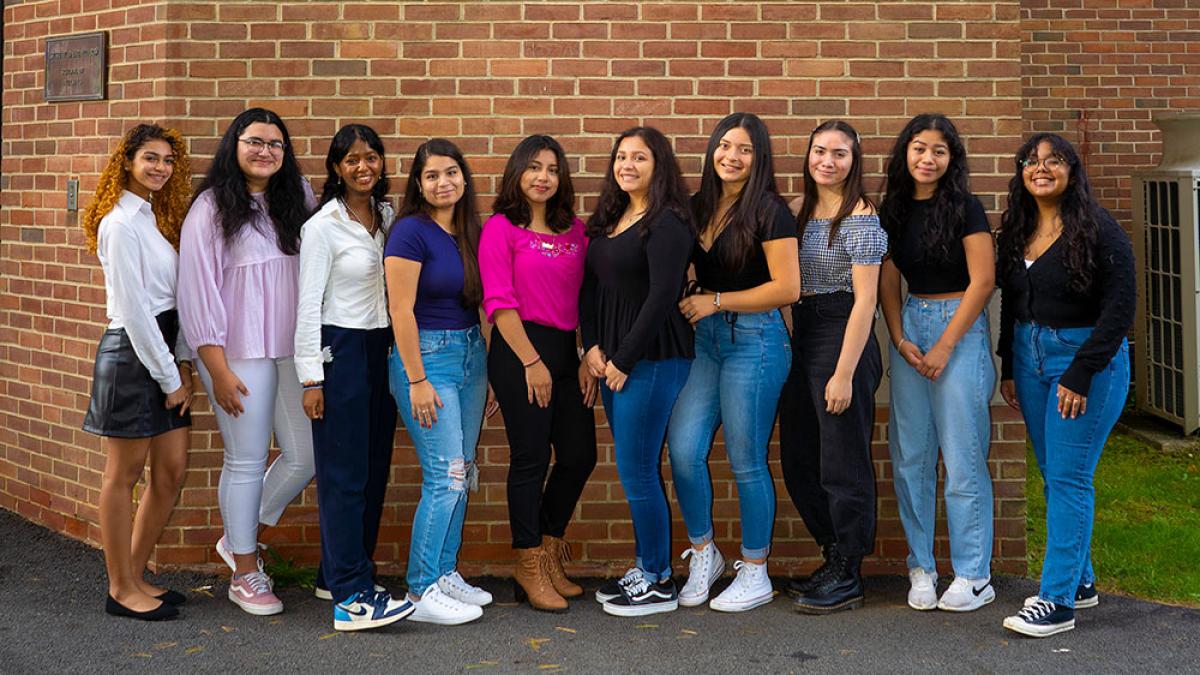
In June 2021, Pace University College of Health Professions (CHP). Lienhard School of Nursing (LSN) received a nearly $2 million federal Nursing Workforce Diversity grant, funded through the U.S. Health Resources and Services Administration (HRSA), created to increase educational opportunities and retention rates for first generation college students from underrepresented ethnic and racial minority groups in nursing. The grant, facilitated through the Lienhard School of Nursing’s innovative STEPS to Success program, provides support, scholarships, mentoring, tutoring, wellness workshops, and resiliency training aimed at preventing burnout and promoting academic success for nursing students. The grant will fund these activities over the four years of the program.
“The grant allows us to better ensure a pipeline of diverse nurses into our local communities. The grant will also support our efforts to recruit and retain a more diverse nursing faculty."
Dr. Rhonda Maneval, Vice Dean, CHP and Lienhard School of Nursing
In late August, CHP welcomed its first cohort of ten enthusiastic HRSA Scholars to the RN4 Nursing Program with an Immersion Week of events and activities planned to acquaint the students with each other, their professors, and mentors and to have them explore the campus facilities and surrounding communities before the official start of the 2021 fall semester.
Student Joeleena Hernandez appreciated that LSN provided them a deeper first look into their next four years, which is something many students do not get to receive before starting their program. “Since we were here for the immersion week, we got to tour the lab and see what we will be doing in future years; we got to see what we have to look forward to.”
Fellow student, Keyla Gudiel echoed Joeleena’s comments, saying that she appreciated learning about nursing terminology, exploring all the resources the program offers, and meeting with the designated mentors who will support them throughout the program.
Reflecting on why they choose Pace University, one of the main reasons was the opportunity to become immersed in clinical work and lab simulations during their sophomore year.
Jackie Maldonado and Alessandra Gutierrez acknowledged LSN’s high NCLEX scores and student support. “Pace offers students a lot of opportunities, and it’s always good to know that if you ever need help, there’s always somewhere to get it,” said Jackie.
Gabriela Casimiro choose the LSN because of the supportive environment among students, faculty, and staff and is excited to benefit from the cohort experience. Commenting on LSN’s direct admit nursing program policy, she said, “I like that you don’t have to compete for your spot and once you’re accepted, you’re in for all four years. “Because of this, the environment is less competitive, and students can help each other out.”
Associate Professor of undergraduate nursing Millie Hepburn, PhD, MS, describes the cohort as highly motivated and enthusiastic. “The group bonded really well early on with both resident and commuter students spending time together on campus, having meals together and taking advantage of activities. There is a lot of good energy there!”
Rhonda Maneval, D.Ed., RN, Vice Dean, Pace University College of Health Professions and Lienhard School of Nursing, author and project director of the grant, noted that receiving this grant is an amazing opportunity for the Lienhard School of Nursing to continue to grow its legacy and commitment to increase racial and ethnic diversity in nursing students and practicing nurses. “The grant allows us to better ensure a pipeline of diverse nurses into our local communities. The grant will also support our efforts to recruit and retain a more diverse nursing faculty. We were thrilled to receive this funding to implementing this important program.”
Dean Marcus Tye extends congratulations to the Class of 2025 HRSA Scholars: Emily Williams, Joeleena Hernandez, Jahaira Pereira, Jaquelyne Maldonado, Sofia Garcia, Evelyn Cabrera, Alessandra Gutierrez, Brithney Tuba, Keyla Gudiel and Gabriela Casimiro.
How Sustainable is Westchester? Assessing the Sustainable Development Goals
Professor Nicholas Robinson and Professor Emeritus Narinder Kakar review how Westchester County measures up
against the globally agreed standards of the UN Sustainable Development Goals.
Haub Law Announces the Beth S. Nelson Memorial Scholarship sponsored by Dorf & Nelson LLP
Pace University's Elisabeth Haub School of Law today announced the establishment of the Beth S. Nelson Memorial Scholarship sponsored by Dorf & Nelson LLP, a private practice law firm.

Pace University's Elisabeth Haub School of Law today announced the establishment of the Beth S. Nelson Memorial Scholarship sponsored by Dorf & Nelson LLP, a private practice law firm.
“We are honored by the generosity of Dorf & Nelson LLP in providing this scholarship,” said Horace E. Anderson, Jr., Dean of the Elisabeth Haub School of Law at Pace University. “Beth Nelson decided to attend law school later in her life, and we are proud to call her an alumna of our law school. This scholarship will lend immediate support to a student in need of financial assistance to pursue their legal education.”
Dorf & Nelson LLP is establishing this scholarship in memory of Beth S. Nelson, partner Jonathan B. Nelson’s mother, to honor her contributions to the Westchester County Bar and her pioneering spirit in embarking in a new legal profession later in life. After graduating, Beth had a successful career in law as a real estate attorney first as an associate at Hall Dickler, then as counsel to Chicago Title, then as General Counsel to Statewide Abstract, and went on to start her own practice, the Law Offices of Beth S. Nelson in Pleasantville, until she retired.
“My mom has been an inspiration to me in so many ways. This scholarship celebrates her inspiration to all law students who follow their dreams, buck the odds and achieve their goals. She is dearly missed, but her example of perseverance lives on,” said Jonathan Nelson.
“We sponsored this scholarship with a preference that it go to a woman not only to honor Beth Nelson but to help a student in need who has chosen law as a second career who may not otherwise be able to afford tuition. Diversity is one of the key cores of Dorf & Nelson’s strength and promoting diversity and women in the legal sector is an example of how the firm can help achieve that,” said managing partner, Jon A. Dorf.
The Beth S. Nelson Memorial Scholarship is a current use scholarship that will be awarded to a student who demonstrates financial need, with a preference for a woman who is pursuing a law school education later in life. A recipient will be selected by the Law School.
About Dorf & Nelson LLP
The entity now known as Dorf & Nelson LLP was founded in 1997. Dorf & Nelson LLP is a private practice law firm headquartered at the International Corporate Center in Rye, New York, with offices in Manhattan, Garden City, New York and Los Angeles, California. Dorf & Nelson serves a wide range of corporations, entrepreneurs, growing businesses and successful companies as both legal counsel and trusted advisors in the practice areas of litigation, commercial and real property finance, corporate law, commercial real estate and land use, employment and labor law, intellectual property, life sciences, medical malpractice defense and not-for-profit. See the Dorf Law website for more information.
20 Years: Remembering 9/11
Join the Pace Community in observance of the 20th anniversary of the tragic events of September 11 as we commemorate the lives lost and honor the bravery and resilience of our community.
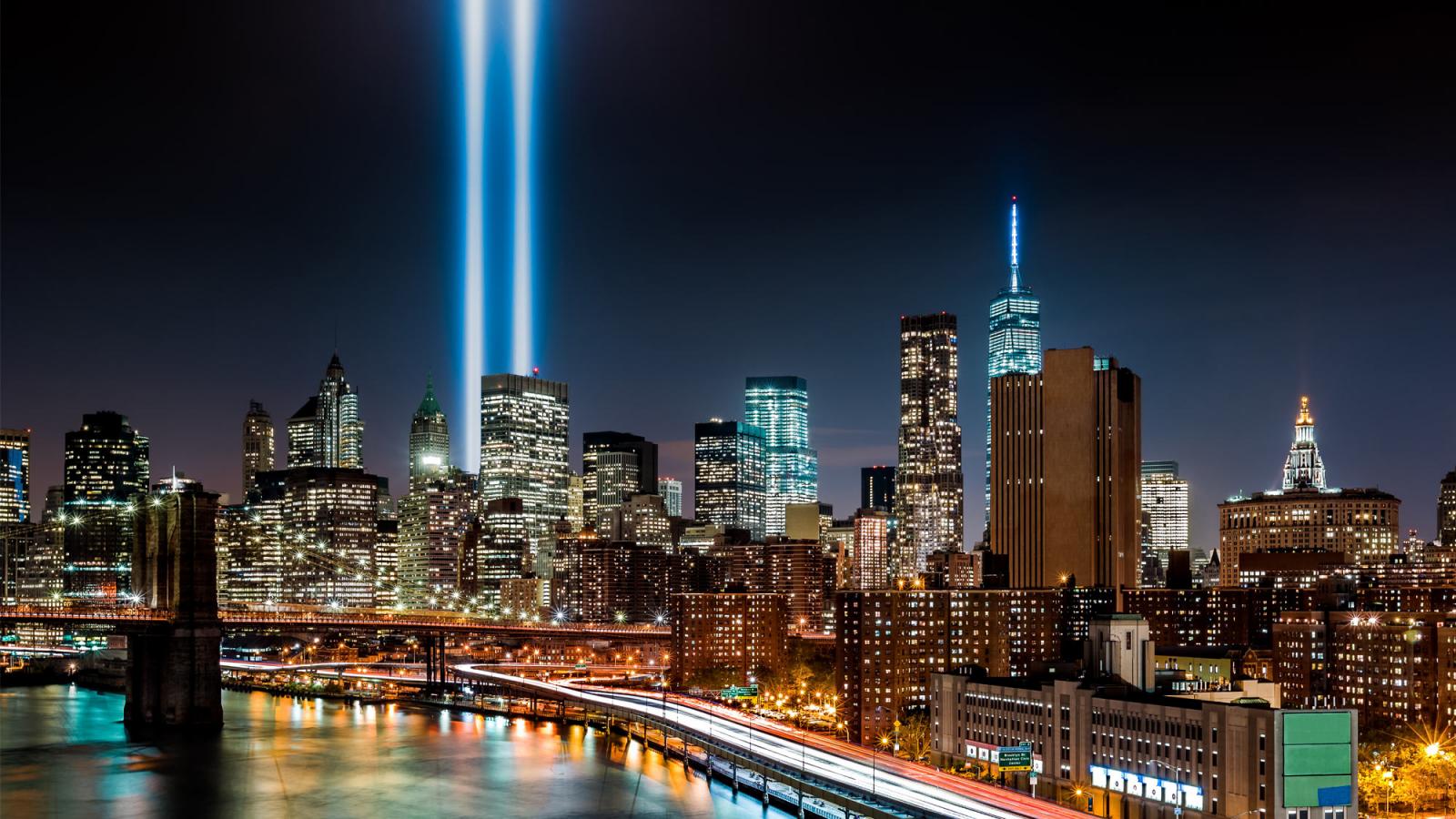
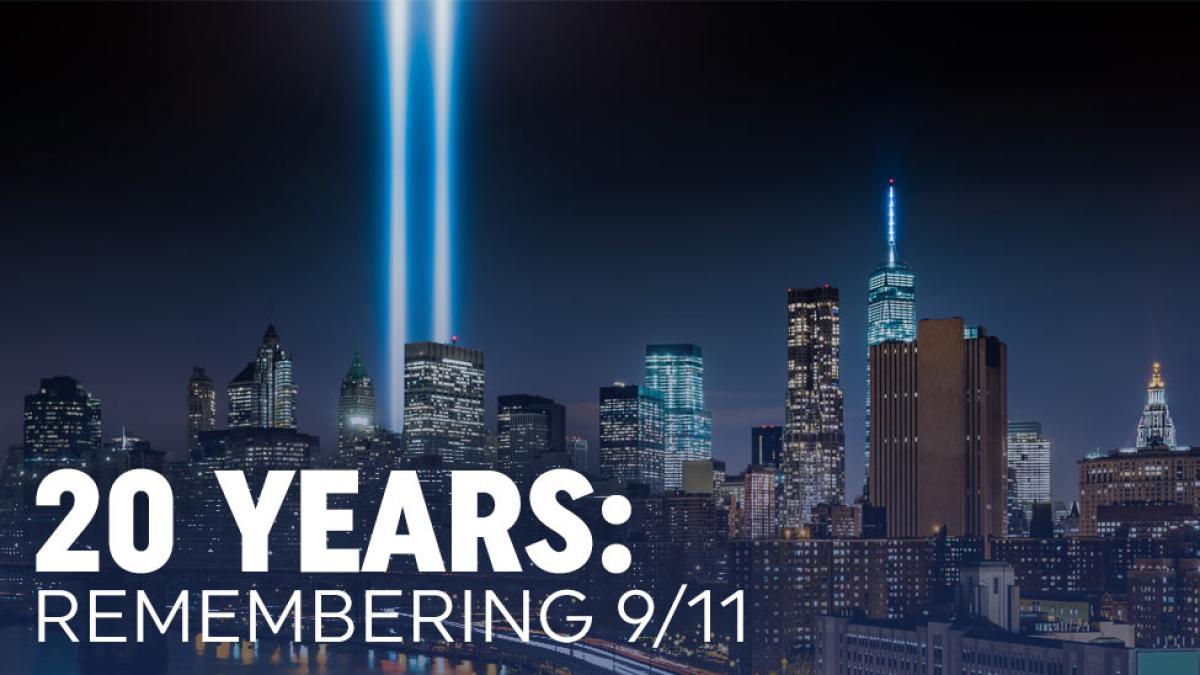
The events of 9/11 have had a profound effect on a generation of people around the world, but our University, located mere blocks away from the World Trade Center, felt the impact first-hand. Twenty years ago, the Pace Community lost 47 members—students and alumni alike—and was closed for several weeks as we worked toward recovery.
Remember
As part of the 20th anniversary of that tragic day, we want to hear from our community. Whether you were a student at the time, a recent graduate, a faculty or staff member, we want to hear from you. For our current students and recent alumni, we want to hear your experiences, too! Perhaps you had a parent or family member working downtown or perhaps you just remember watching it on the news; your experience of an event that shaped a generation is just as valid. Please consider sharing your memories and experiences with us as part of story collection for the upcoming Fall 2021 issue of Pace Magazine. Use our submission form.
Read and Listen
Explore the Pace University 9/11 Oral History Project curated by Professor Maria Iacullo-Bird, PhD, and archivist Ellen Sowcheck. Read the student newspapers from the days following September 11, listen to the interviews conducted by Pace students, and learn more about our on-campus memorials.
Watch
On the 10th anniversary of September 11, members of the Pace Community reflected on their experiences and what it meant to be a Pace Setter during that time.
Meet Brandon Jeffrey Joachim
"I chose Pace for many reasons such as the very supportive on-campus community, the wonderful connections available, and the convenient location, among other considerations. Above all, I chose Pace because of the number of hands-on experiences available to students in the early stage of their college path." - Brandon Jeffrey Joachim, class of 2021
Class of 2021
Nursing (RN4)
Hometown: Brooklyn, NY
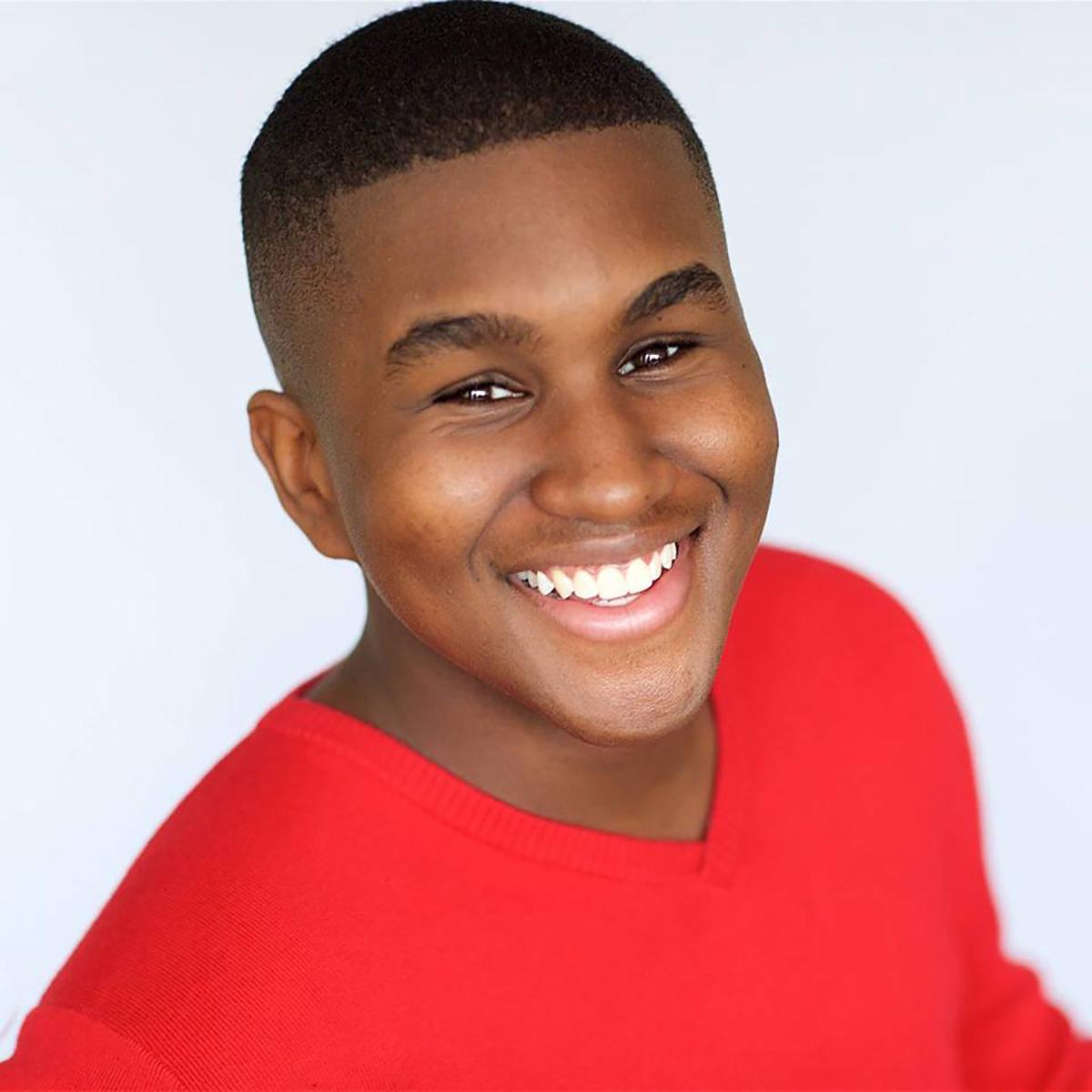
I chose Pace for many reasons such as the very supportive on-campus community, the wonderful connections available, and the convenient location, among other considerations. Above all, I chose Pace because of the number of hands-on experiences available to students in the early stage of their college path. As someone who is a hands-on learner and can't learn effectively simply through textbooks and tests, it was amazing and very valuable to me to learn that as early has my first semester of Sophomore year, I'd be all scrubbed up and in our top-notch Nursing simulation labs learning a plethora of skills that we would apply and use in the actual hospital setting! Even more amazing was that one semester later, we'd already be starting clinical rotations in actual hospitals, applying what we’d learned in class to the real world. This immersive learning experience helped me grow tremendously in knowledge and practice. Because of this early exposure, and the extremely supportive faculty and staff, I would definitely recommend Pace to all prospective students. Pace has given me a positive outlook on the future for myself, my peers, and our community as a whole.
Ever since I was a child, I've always been interested in many things. From acting, to political science, to journalism, my interests bounced all around, but at the core of it all, I knew I wanted to interact with people and provide support and happiness. Nursing seemed like a very good choice for me, because it allowed flexibility for me to do things outside of the job that I still appreciated. However, it wasn't until I took a Pace tour that I genuinely saw Nursing as a program that I'd truly enjoy. From hearing the excitement and experience from the current Nursing students and faculty at that time, to learning about the non-competitiveness due to the direct admissions to the program, and also learning about the early exposure to clinicals, Pace really piqued my interest in the career as a whole. All the previous colleges and universities I had visited to learn about Nursing seemed to solely focus on exams, numbers, and many other things whereas at Pace, I immediately felt valued as a person and an individual and truly saw the passion the faculty, staff and students had about the program. This ultimately led me to pursuing the Nursing program, that I now love so much, here at Pace.
It's hard to choose a favorite class I have because there are so many wonderful ones! I had a wonderful class Freshmen year which was called Nature in Photography! Like many of Pace's classes, this was a hand's on class and in it we got to explore the world of Nature through literature, science, and life while simultaneously engaging in the world of Photography. We made trips to the Rockefeller State Park Reserve, would present new photos on a bi-weekly basis, and in general really got a chance to see our classmates grow in skill and knowledge. Through this time, some of my classmates and I had the opportunity to partake in a Mock Trial in front of actual members of the New York State Assembly and present an issue and a possible solution on the problem of water pollution on the Hudson River. At the end of the semester, after the Mock Trial and the many fun classes and experiences we had, we held a Photography Exhibit in the Mortola Library, and our artwork was able to stay there for the whole semester for the community to see! Besides this wonderful class, I've loved all of my Nursing classes so far due to the wonderful and immersive clinical experiences that come along with it.
I had a very unusual path from high school to college, but Pace definitely helped make the transition smooth and easy. I went to a conservatory-based high school where I spent a majority of my day taking classes as a Drama Major. However, a made a complete flip and went to pursue Nursing without any prior experience or knowledge in the field. The wonderful, personable Nursing faculty and staff provided assistance in whatever I needed and really helped engineer their curriculum and teaching to help learn as an individual. As far as transitioning to campus life, Pace did a great job at that as well! Coming from busy New York City, I was afraid that the campus at Pleasantville would be too quiet and calm for my liking. However, I was proven wrong. Now, it's actually hard for me to do everything I want to do because there are always so much happening!
Having clinical rotation as early as my Sophomore second semester has been truly valuable and continuing that throughout each semester has been extremely beneficia to my education, courage, and nursing skills. I’ve had so many wonderful clinical experiences, but one of my favorites was my first MedSurg clinical rotation at NYP-Cornell in Manhattan. I dream about working at NYP, and having my rotation there was a great experience. With an amazing clinical instructor and a very supportive hospital staff, I was able to shadow nurses and perform tasks such as administering medicine, performing vitals, providing therapeutic communication. Through it all, I was able to connect with, shadow, and learn from a lot of different staff. From it, I made multiple connections and obtained many referrals and internship/job opportunities from the people I met. By the end of my experience there, not only did the nurses and staff trust me to carry out various tasks, but, more importantly, I trusted myself and my capabilities as a nursing student to carry out tasks that actual nurses would perform. I am currently excited for my preceptorship at Memorial Sloan Kettering Cancer Center, which is the #2 ranked Cancer Center, in the U.S. I've been given the opportunity to shadow a nurse for full 12-hour shifts, during which I'll be learning about Oncology. Pace's clinical opportunities and connections have been a vital part of my education as a Nursing student. I truly believe it is one of a kind!
I'm also extremely involved in campus extra-curricular opportunities. Previously I was the CHP Ambassador for our Student Government Association, and now I am the very first Diversity Ambassador for Pace University on the Pleasantville campus where I advocate for Diversity, Equity and Inclusion on campus! I also have jobs as a tour guide, an RA, and an ApogeeTV Ambassador. I'm a member of the Alpha Chi Rho fraternity, the National Student Hall Honorary, the Black Student Union, Dominican Student Association, and Senior Planning Committee. In my free time outside of these extracurriculars, I like to play basketball, juggle, or go with friends to other events around campus.
Meet Caitlin Oris
"I chose Pace College of Health Professions for a bunch of reasons. The program was a direct admit nursing program and also had a high NCLEX pass rate. That definitely caught my attention when applying to colleges. But what eventually sealed the deal was when I took a tour of Pace and learned about the amazing clinical sites and opportunities offered to students. There are many clinical sites, especially in New York City, which is where I plan to work in the future." - Caitlin Oris
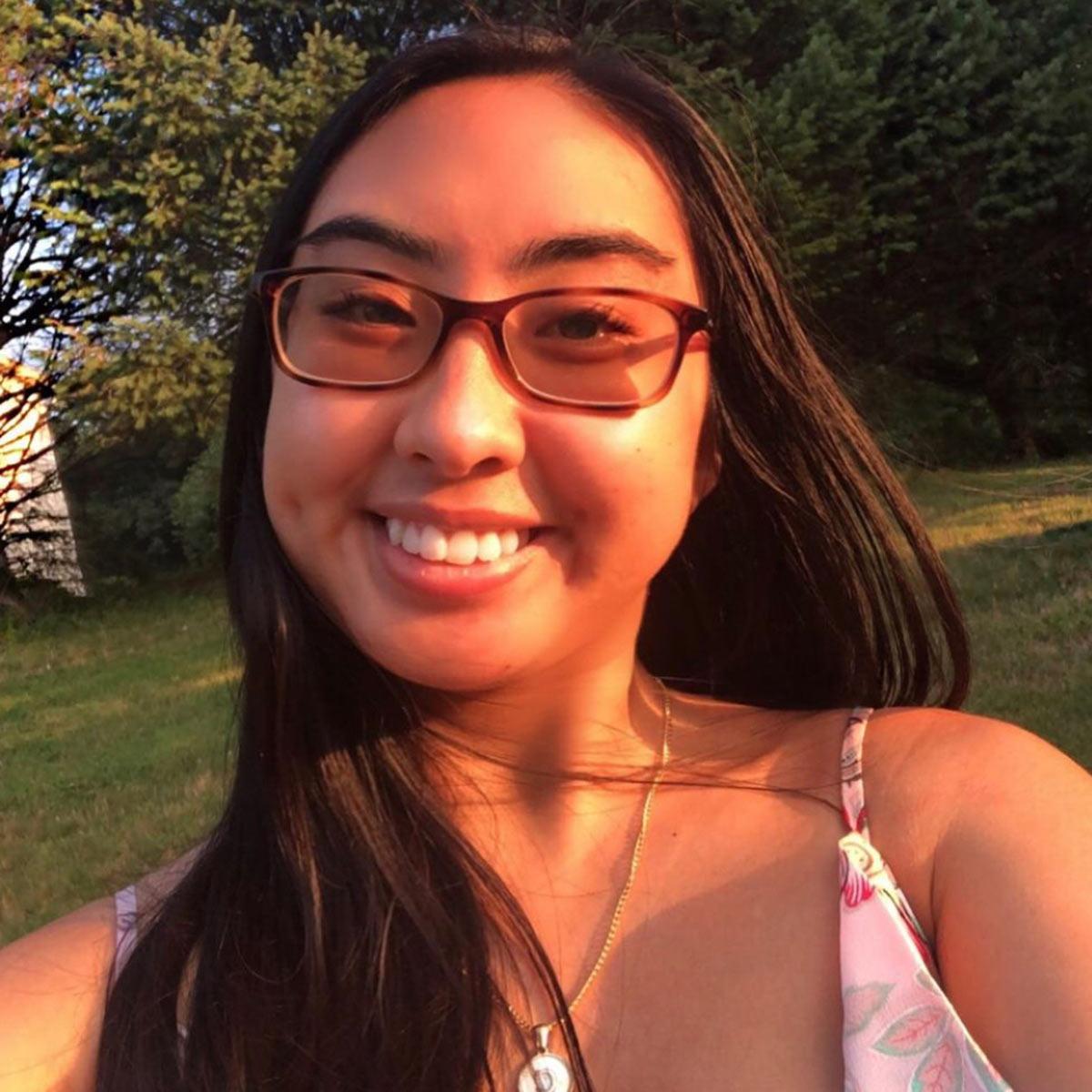
I chose Pace's College of Health Professions for a bunch of reasons. The program was a direct admit nursing program and also had a high NCLEX pass rate. That definitely caught my attention when applying to colleges. But what eventually sealed the deal was when I took a tour of Pace and learned about the amazing clinical sites and opportunities offered to students. There are many clinical sites, especially in New York City, which is where I plan to work in the future.
My mom is a nurse, and she definitely sparked my interest in the profession. Additionally, my time as a volunteer in an ambulance corp. while in high school showed me how meaningful and impactful helping people is. Knowing that I will be able to make a difference in someone's life is what encourages me as I pursue my BSN and makes me super excited to enter into the profession!
I'd say that I had a pretty painless transition from high school to college life, and I attribute a lot of it to the Setter's Leadership Program, through which I was able to go on a leadership retreat with other incoming freshmen in upstate NY. And although we all dreaded not having cell service, it was a great way to make friends, and I still talk to a lot of them to this day! Pace also offers week of welcome activities, involvement fairs, and a UNV 101 class that all collectively help make your transition as easy as possible.
Some of my favorite classes so far are Anatomy & Physiology and Nursing Fundamentals, which both have a lab component. In the Anatomy Lab class, I was able to dissect a cow eye, sheep heart, and a cat, which really enhanced my understanding of the material. In Nursing Fundamentals, I've learned how to insert a catheter, how to change a dressing, and how to administer medication. These hands-on experiences help boost my knowledge and confidence as I continue my education here at Pace.
Although I haven't had any clinical experiences yet, as I am only a first semester sophomore, I am excited to have my Med/Surg clinical next semester!
There are so many opportunities to be involved in clubs and extra-curriculars here at Pace. I am a part of the Setter's Leadership Program and Asian Student Union, a peer leader, tour guide, and a member of sorority and fraternity life.
INDYCAR featured 21-year-old Pace University student Myles Rowe in “Rowe Makes History with USF2000 Victory in New Jersey - IndyCar Series”
The 21-year-old Pace University student from Atlanta produced a sensational performance in mixed conditions following an earlier rain shower for his first USF2000 victory and first win for the Indianapolis-based Force Indy team, which was formed in December 2020 as part of the Race for Equality & Change diversity initiative introduced in July 2020 by INDYCAR and Indianapolis Motor Speedway.
Pace Law Advocacy Board announces inaugural publication of The Advocate’s Advantage blog
The Pace Law Advocacy Board is excited to announce its inaugural publication of The Advocate’s Advantage, the official blog of the Pace Law Advocacy Program.
The Pace Law Advocacy Board is excited to announce its inaugural publication of The Advocate’s Advantage, the official blog of the Pace Law Advocacy Program. The blog publishes articles written by both students and faculty pertaining to a variety of trial, appellate, and evidentiary issues. Please subscribe to The Advocate’s Advantage and receive notifications of new posts! The editors are always seeking submissions from both faculty members, students, and alumni. If you would be interested in publishing an article, please contact advocatesadvantage@law.pace.edu.
Medical Xpress featured Dyson Professor Brenna Hassinger-Das in “Science-backed tips for maximizing play time with kids”
A new paper led by Penn State graduate Brenna Hassinger-Das, now an assistant professor of psychology at Pace University-NYC, and Jennifer Zosh, professor of human development and family studies at Penn State Brandywine, explores the science-backed core pillars of learning and examples of play spaces that incorporate them.
Word & Way featured Haub Law Professor Bennett Gershman in “Guilty Even When Proven Innocent”
“Prosecutors have a constitutional and ethical obligation to ensure that innocent people do not get punished,” wrote Pace University law professor Bennett Gershman. “As the number of exonerated defendants continues to grow, however, it becomes increasingly clear that prosecutors, either by affirmative acts of misconduct, or a failure to carefully and responsibly scrutinize the quality of the evidence, sometimes do contribute to defendants’ wrongful convictions.”